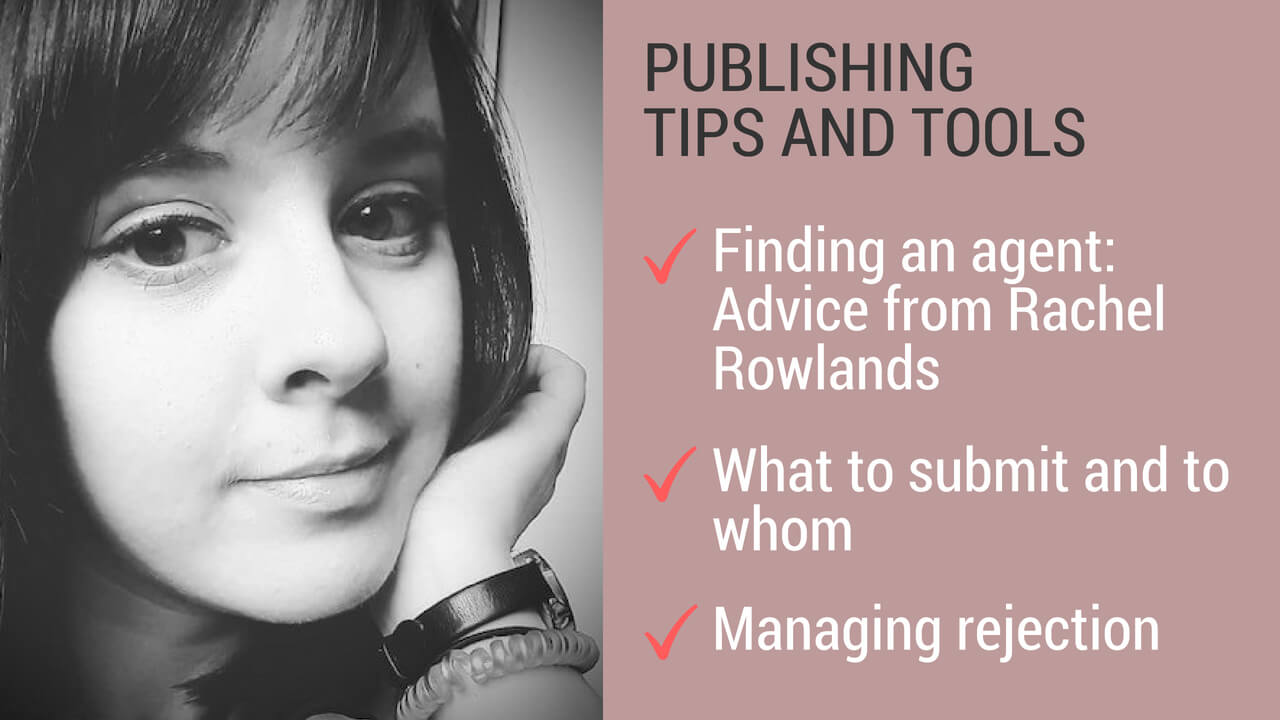|
Are you looking for literary representation? My guest Rachel Rowlands has some helpful advice on how to find an agent, what to submit and to whom, and dealing with rejection professionally.
Literary agents hold the golden ticket that will get you into the chocolate factory. If you want to get published traditionally, they’re essential.
Getting an agent is competitive, and it isn’t easy, but if you’re stubbornly passionate about your work and don’t give up, it can be done. I hope my journey and what I’ve learned along the way will inspire you and help you. Buckle up, because it’s a bumpy ride.
Before submitting
The process starts long before you even think about submitting to agents. Write. Abandon projects. Start new projects. Finish projects. Learn about the craft. This can take years. You may even develop a few grey hairs along the way. I’ll rewind a bit and give you an example: I’ve always written stories. I wrote my first ‘novel’ when I was 16. It was about angels of light and darkness and doors to other planets, and it was heavily inspired by Kingdom Hearts, a game I was obsessed with. But I had fun, I loved writing it, and it taught me how to plan and finish something. I wrote three other books before writing the one that led to me signing with an agent – at 27. You need time to develop as a writer, to hone your craft. Your first book most likely won’t be the one that gets you where you need to be. Your second might not either, and that’s okay. No one becomes an expert overnight. Here are some other things that you might want to do before you start hunting for that elusive agent, aside from writing books until your fingers nearly fall off:
Finding and submitting to an agent
Do your research No agent should charge you money – they work on commission. Any agent who wants you to pay upfront is a scammer and you should run far, far away. A great place to hunt for agent details if you’re in the UK is the Writers’ & Artists’ Yearbook. QueryTracker is great, too; it lists agents from all over the world (although some UK-based agents are missing from the database). You can even use it to track your submissions and the replies you receive. Otherwise, I recommend doing your own tracking via, say, a spreadsheet. It doesn’t matter where in the world you’re based in terms of who you submit to – many agents work with foreign co-agents. So, for example, if you’re based in the UK it’s perfectly fine to query both UK and US agents. Follow submission guidelines Every agency has different guidelines – some want you to send a cover/query letter and three chapters. Others might just want an initial query letter. Treat these guidelines as law. Also, be professional in your letter (read Query Shark, a blog on writing query letters, like your life depends on it). Get someone to critique your query letter before it goes out. Don’t make it easy for someone to say no! Don’t send your book to everyone at once Submit to a small batch of agents first, somewhere between 5 and 10. If you get any feedback, rework your manuscript and then send out a new batch. Note, however, that this strategy can be problematic because you won’t always know why an agent rejects a book; it might be purely subjective. Still, you don’t want to exhaust all your options in one go! Try to keep it balanced. Don’t get keyboard-happy and send your book to 200 agents.
After submission
Be in it for the long haul and be prepared for rejection I submitted two manuscripts over the course of two years, racking up a couple of hundred rejections. It wasn’t easy. The first book I queried got standard, copy-and-paste rejections almost across the board (also known as ‘form rejections’), although two agents did ask to read it. One asked me to send it back after doing some revisions, sometimes called an R&R or a revise and resubmit (sadly it doesn’t mean rest and relaxation). I never heard from that agent again, even after several polite nudges. As for the second book I sent out, there was a flurry of interest. Suddenly, lots of people wanted to read my book. But then … the standard rejections started rolling in. I even had an agent ask to meet me when she was halfway through my book. Then she called and rejected me after she’d finished reading. A phone call from an agent is generally a sign that they want to work with you, so that was pretty crushing. Some days, I wanted to quit because it felt easier than carrying on. But in the wise words of J.K. Rowling, ‘It is impossible to live without failing at something, unless you live so cautiously you might as well not have lived at all.’ I kept going. Another agent called me up. We talked revisions. I worked on them for six weeks and we bounced ideas back and forth. She really got my book and what I was trying to do, and she loved my edits. After two and a half years of submitting, five manuscripts, and many I’m-going-to-quit-writing-forever threats, I signed the contract. Don’t reply to rejections Really, don't, unless the agent personalized your rejection and mentioned your book/characters specifically. In that case, feel free to send them a quick thank-you note. Never send sassy or scathing replies like, ‘You don’t know what you’re missing out on’ or ‘Your loss, sucker’, even if that’s what you’re thinking. Vent in private. That’s what writer friends/cats/brick walls are for. If an agent sends you a rejection, but invites you to submit future work, do it! They haven’t slammed the door shut, they’ve left a gap for you – and it means they see potential. Keep their name and email address, and when you have a new project ready, send it to them and remind them who you are. All in all, remember that no project is ever wasted. You’ll learn something from every manuscript, and even if you don’t land an agent straight away, you’ll be making connections and putting your name out there. Treat your rejections as badges of honour because they mean that you’re still in the game, and one day you’ll get to the next level. Good luck! More resources
Rachel Rowlands is an independent editor and an author of young adult books. With her editor hat on, she works for a growing list of publisher and author clients on both fiction and trade non-fiction. She has a degree in English and Creative Writing and is represented by Thérèse Coen at Hardman & Swainson. She can be found at www.racheljrowlands.com and on Twitter: @racheljrowlands.
Louise Harnby is a fiction line editor, copyeditor and proofreader who specializes in helping self-publishing writers prepare their novels for market.
She is the author of several books on business planning and marketing for editors, and runs online courses from within the Craft Your Editorial Fingerprint series. She is also an Advanced Professional Member of the Society for Editors and Proofreaders. Louise loves books, coffee and craft gin, though not always in that order. Visit her business website at Louise Harnby | Proofreader & Copyeditor, say hello on Twitter at @LouiseHarnby, or connect via Facebook and LinkedIn. If you're an author, take a look at Louise’s Writing Library and access her latest self-publishing resources, all of which are free and available instantly.
2 Comments
lorena JARVIS
5/8/2020 04:15:32 pm
Hi! What would it be the best way to find an agent? no fiction, for a total newbie writer :) x
Reply
Louise Harnby
5/8/2020 05:43:29 pm
I'd recommend following the same steps that are outlined in the post above. The same principles apply with fiction and non-fiction.
Reply
Leave a Reply. |
BLOG ALERTSIf you'd like me to email you when a new blog post is available, sign up for blog alerts!
TESTIMONIALSDare Rogers'Louise uses her expertise to hone a story until it's razor sharp, while still allowing the author’s voice to remain dominant.'Jeff Carson'I wholeheartedly recommend her services ... Just don’t hire her when I need her.'J B Turner'Sincere thanks for a beautiful and elegant piece of work. First class.'Ayshe Gemedzhy'What makes her stand out and shine is her ability to immerse herself in your story.'Salt Publishing'A million thanks – your mark-up is perfect, as always.'CATEGORIES
All
ARCHIVES
July 2024
|
|
|
|



















 RSS Feed
RSS Feed





